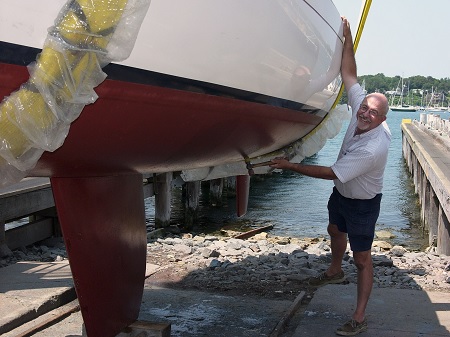 For many people, buying a boat is the second largest purchase they will make in their lifetime, and at the center of this process is your friendly marine surveyor. Ensuring that you know everything you possibly can about a used boat (and even some new boats) is a smart move. If you catch issues before taking the deal, you have the option of renegotiating the price or seeing that the faults are corrected. Here are five things Society of Accredited Marine Surveyors (SAMS)-accredited marine surveyor and BoatUS Magazine Associate Editor Mark Corke advises every boater should know this spring buying season.
For many people, buying a boat is the second largest purchase they will make in their lifetime, and at the center of this process is your friendly marine surveyor. Ensuring that you know everything you possibly can about a used boat (and even some new boats) is a smart move. If you catch issues before taking the deal, you have the option of renegotiating the price or seeing that the faults are corrected. Here are five things Society of Accredited Marine Surveyors (SAMS)-accredited marine surveyor and BoatUS Magazine Associate Editor Mark Corke advises every boater should know this spring buying season.
1. Surveys generally cost around $20 to $22 per foot, and it could be some of the best money ever spent. Most surveyors have a set fee based on the size and type of boat and the type of survey. A “condition and value” survey is most common for boat purchases. Be wary of “light” or abbreviated surveys that help neither the buyer nor seller and often won’t be accepted by banks or insurance companies. Hiring a local surveyor helps to avoid travel costs, and surveyors typically won’t send a survey report until they get paid.
2. Don’t choose a surveyor recommended by the seller or his/her broker. The surveyor works for you and you only. Just like you would not select a home surveyor recommended by the seller, find your own marine surveyor. If friends or your marina can’t recommend one, go to BoatUS.com/Insurance-Survey. Keep in mind that a survey is only good for a specific time period. Old surveys should be viewed as unreliable; sellers sometimes try to pass off old information that doesn’t reflect the boat’s condition today.
3. Prepare the boat. Before the surveyor arrives on the day of the survey, empty out any lockers or storage areas with access to mechanical parts or machinery. This will make things go much smoother and helps achieve a thorough review.
4. Don’t hover, and don’t bring friends or guests on the sea trial. Most surveyors encourage buyers to be at the survey to have an open dialog, but give the surveyor space and time to do the job and don’t bring any unnecessary family members or guests. It’s not a celebratory boat ride.
5. Use your surveyor to the fullest. Surveyors appreciate you understanding the survey report and will enjoy a conversation to discuss. Keep in mind that it’s their job to bring you all the news, including the good and the not so good. They appreciate sharing their knowledge to help you make informed buying decisions, so take advantage of the time offered to you.
For additional help with buying a boat, go to the free online BoatUS Boat Buyers Toolbox at BoatUS.com/Buyer.
